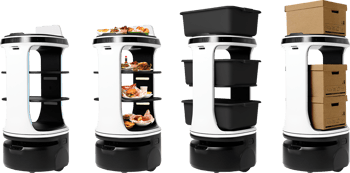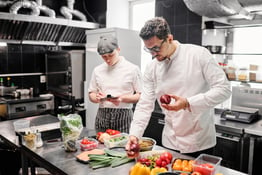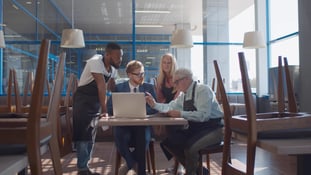When you own and operate a restaurant, you’re on the clock 24/7. You have no time to waste. So when you schedule a restaurant tech demo, you have to get the most out of every minute. And in a highly saturated market of tech solutions for restaurants, you need to get enough information out of every tech demo to make an informed choice.
But to get the right information, you need to ask the right questions. Ken Tsang from all-in-one IT consultancy Science On Call gave us some advice on the best questions to ask during a restaurant tech demo.
7 Questions For Your Next Restaurant Tech Demo
Tech solutions for restaurants are plentiful, but that doesn’t mean you can choose just any provider. You need to select the tech that matches your needs, offers meaningful ROI, and can be integrated into your restaurant tech stack with minimal disruption. The restaurant tech demo is your opportunity to find out whether a given solution checks all of these boxes.
Tsang helped us zero in on the key questions that you must ask at your next restaurant tech demo.
1. Which solutions do I realistically need to demo?
Before you can decide which tech solutions are right for your restaurant, you need to have a full understanding of what your needs are. Tsang recommends putting together a list of factors that you think should inform your decision.
The first step is “understanding what's important to you, coming up with some kind of rubric for determining how you're going to decide what's important”
This is both an opportunity to highlight the features that matter most, and to narrow the very dense field of restaurant tech solutions down to only those that actually match your needs.
“It's worth being honest and saying ‘We're probably not going to go with these solutions because they’re just too expensive,'" Tsang advised.
Weed out the solutions that just aren’t a realistic fit for your business, and focus on the functions that really matter.
2. Who are the key players in your category, and how do your features compare?
The restaurant technology landscape is complicated, confusing, and full of vendors with highly specialized functions like cloud-based POS, third-party delivery, mobile reservation systems, etc. One of the best ways to navigate these often overlapping spaces is to quiz reps on how their solutions fit into the market.
During your next restaurant tech demo, Tsang suggested asking vendors who they view as their direct competition.
“It's totally worth asking,” he said. “Because you want to understand these products as well as possible.”
Ultimately, inquiring about the competition is a great way to line up 3 or 4 more demos in the same space.
“Generally that seems to be a good number,” Tsang said. “The thing about doing a few demos is you get to hear about features you might not have thought about.”
3. How does your pricing work?
Any tech solutions you choose need to fit your restaurant’s budgetary needs, and you need to be sure that you’ll gain a profitable return on your investment. Third-party providers should be able to articulate why their solution is worth your money.
“It's always worth asking, especially if it's a complex fee structure,” said Tsang. “Get those questions out of the way, especially if [price might] be a barrier.”
And as long as you’re asking about cost, this is also a great point in the restaurant tech demo process to find out if there’s any wiggle room. Tsang suggested inquiring about a price break “if you really like a solution but don't like the price.”
4. How much tech does my restaurant actually need?
Not only do tech solutions for restaurants come in all different areas of specialization, but they also come at an extremely wide range of product tiers and price points. Any time you find yourself in a restaurant tech demo, be sure to press the rep on whether or not this is really the right tool for your business.
Spending for the most advanced solution on the market may not always be the best use of your resources.
“Most customers don't need the Cadillac version every time,” said Tsang.
Be sure that any provider you partner with offers a solution commensurate to your needs. Naturally, you want your tech to be powerful enough to handle your restaurant’s needs, but you also don’t want to overspend on tech you’ll never fully leverage.
5. Who handles implementation?
This is an important part of ensuring you get what you’re paying for. How much of the implementation process will be handled by the vendor? How much will your restaurant need to do on its own?
“We want to make sure you know what's covered and what's not,” said Tsang. “With implementation, who's in charge of it? Who's gonna make sure it gets carried through to the end? Is it largely dependent on the customer to come up with… or is there somebody on the vendor side that's guiding the project and is going to be an active resource along the way?”
Your reps should have solid answers for these questions during your demo. Tsang suggests taking careful notes during this section of the demo so that you’re in a position to hold your vendor accountable for their sales promises.
6. What does your customer service package include?
Effective vendor support shouldn’t end with implementation. You need to know just how much support you can expect from your provider over time.
“I think that's a good question as well,” said Tsang. “‘OK so we get this thing implemented, and something breaks six months down the road. What kind of support tiers do you have?’”
According to Tsang, customer service offerings “are things that a customer doesn't necessarily think about when they're sort of getting wowed by the excitement of a demo," but the level and quality of customer support can be a gamechanger once your restaurant has become dependent on the optimal functionality of these tech solutions for everyday business.
7. Is the product compatible with my tech stack?
System compatibility is also essential when choosing tech solutions for restaurants. You need to know that the technology you choose can be integrated into your current tech stack with minimal disruption.
“There are so many products out there that do niche things, but if they don't work with your POS system, for example, it's gonna be extra work for you,” warned Tsang.
The goal is to choose a system that enhances the efficiency of your operation without derailing your existing workflow. Make sure you ask about all integration and compatibility issues during your next restaurant tech demo.
Looking To The Future
Of course, system compatibility is about more than just working with your existing tech stack. You also want to know whether or not a given product is capable of scaling and integrating with future innovations.
As Tsang put it, “You should be willing to ask vendors whether their product will support your vision.”
The best way to do that is to start scheduling restaurant tech demos and preparing your questions today. If you're feeling overwhelmed by all of your options and want some additional support through the process, our team of Back of House experts are here to offer you the guidance you need to feel confident about making the right decision for your restaurant. Getting started is easy; simply book your free discovery call today.
Note: This paid partner content was created in collaboration with Science On Call, a Back of House Preferred Partner.





